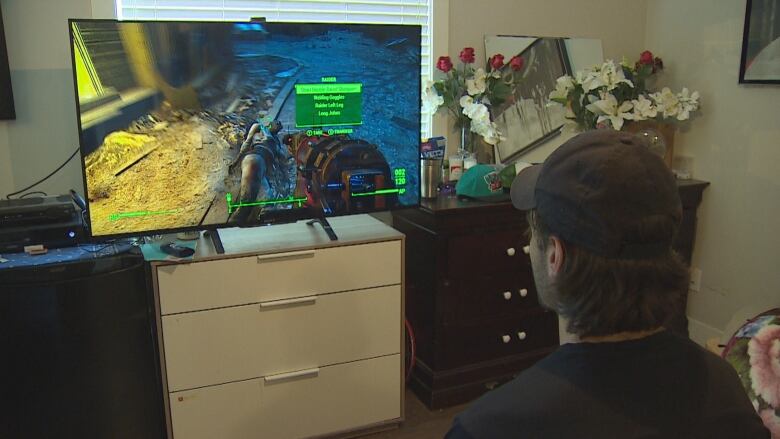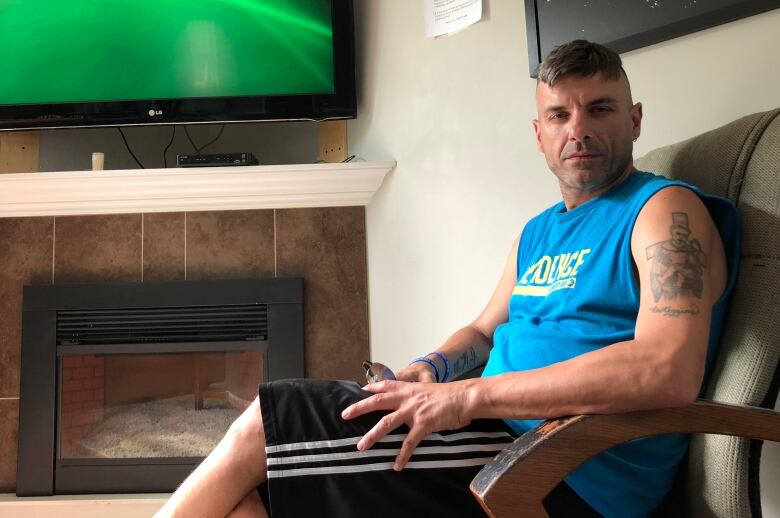City orders closure of unregistered recovery home sheltering dozens of patients
Founder of Back on Track Recovery in Surrey fears residents will end up back on street

After 20 years grappling with a crystal meth addiction, Cole Izsak believed he found his calling in life.
He became soberinside a recovery home, and decided he wanted to open one of his own.
Izsak founded Back on Track Recovery a collection of six buildings in Surrey for recovering addicts,including a four-home complex known as The Fortressthat's beloved by patients.
"The Fortress is the perfect place for this line of work we're not in a neighbourhood and we're close to public transit and we're close to the hospital," said Izsak.
But residents of the recovery house will soon be forced to leave, some of them having lived there for years. City bylaw enforcement has issued a notice ordering the facility to shut down by mid-summer due to licensing issues.
Izsak, 57, now fears for the health of his patients who have come to rely on the services, and will soon find themselves back on the street.

Unlicensed, unregulated
The homes inside The Fortress are well maintained, and the kitchens are always stocked. The walls are lined with inspirational messages and there areevennarcan kits hanging inside each room, just in case.
Izsakopenedthe recovery house over three years ago, back when there were few regulations for recovery homes across B.C.
But times have changed.
The province and municipalities have since imposed licensing requirements for all recovery homes following widespread reports of corruptmanagers andpoor living conditions in many of the facilities, particularly in communities like Surrey.
"Surrey became a magnet for recovery houses, and most of the recovery houses that were established were not legitimate they were cash grabs, they were crack shacks," said Izsak.
Recovery homes now need a municipal business licencefor every 10patients to operate. They must also beapproved by the province throughB.C.'s Assisted Living Registry.
With upwards of 40 patients, Izsak says The Fortress needs four business licences to keep operating, but he was only issued two by the city's previous government. The deficithas kept him from getting the entire facility approved by the province.
He says he can't get the other two because the city has capped the number of homes allowed in the community to 55.

Forced closure
While the previous city government turned a blind eye to the unregistered facility, Izsak says the new administration is clamping down.
On Tuesday, bylaw officers issued a notice ordering him to shut down The Fortress by August 15 citing illegal use by operating without a business licence.
Now he fears dozens of residents, many of whom are from Vancouver's Downtown Eastside, will be forced back onto the streets.
"If you take a man early in recovery and you deny him his own and his support ... he will return to his addiction," said Izsak.
Residents rally
Residents at the facility are speaking out against the forced closure, many of them having lived at previous facilities without the same level of care and support.
For Antonio Guidotti, the Fortress was a welcomed change after his previous experience inside a court-ordered recovery home.
"[There was] no food, locks on fridges, locks on cupboards, pills being pushed to other clients," said the38-year-old. "[Here], they want you to flourish. They want you to prosper."
Residents there pay $30 per day, and have access to educational programs and outdoor activities like fishing, sports, and even skydiving.
Recovering heroin addict Aaronhopes to parlay his success at the Fortress into a career as a truck driver.
"It's just special to me. The houses and the facilities are clean, we have so much food here. There's good programming here. They care here," Aaron said
CBC News reached out to both the Ministry of Health and the City of Surrey but did not receive a response by publication time.
Izsak says he's reaching out to city councillors in hopes of finding a solution before the shut down.
"These young men here are like my sons, and I love them," he said.












_(720p).jpg)


 OFFICIAL HD MUSIC VIDEO.jpg)
.jpg)



























































































